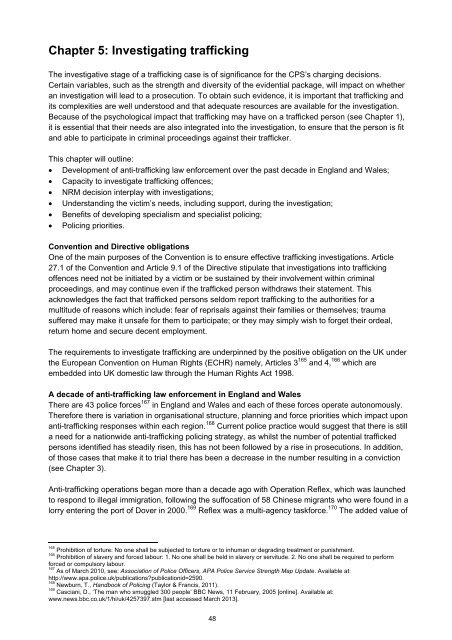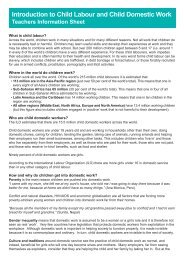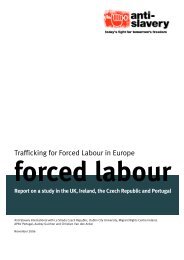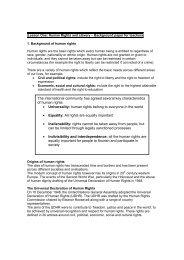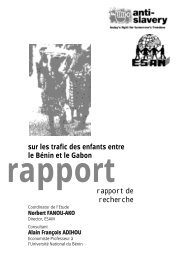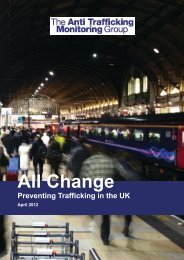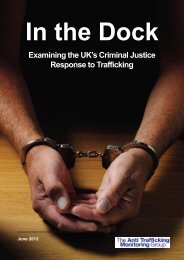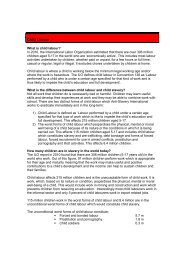Chapter 5: <strong>In</strong>vestigating traffickingThe investigative stage of a trafficking case is of significance for <strong>the</strong> CPS’s charging decisions.Certain variables, such as <strong>the</strong> strength and diversity of <strong>the</strong> evidential package, will impact on whe<strong>the</strong>ran investigation will lead to a prosecution. To obtain such evidence, it is important that trafficking andits complexities are well understood and that adequate resources are available for <strong>the</strong> investigation.Because of <strong>the</strong> psychological impact that trafficking may have on a trafficked person (see Chapter 1),it is essential that <strong>the</strong>ir needs are also integrated into <strong>the</strong> investigation, to ensure that <strong>the</strong> person is fitand able to participate in criminal proceedings against <strong>the</strong>ir trafficker.This chapter will outline:• Development of anti-trafficking law enforcement over <strong>the</strong> past decade in England and Wales;• Capacity to investigate trafficking offences;• NRM decision interplay with investigations;• Understanding <strong>the</strong> victim’s needs, including support, during <strong>the</strong> investigation;• Benefits of developing specialism and specialist policing;• Policing priorities.Convention and Directive obligationsOne of <strong>the</strong> main purposes of <strong>the</strong> Convention is to ensure effective trafficking investigations. Article27.1 of <strong>the</strong> Convention and Article 9.1 of <strong>the</strong> Directive stipulate that investigations into traffickingoffences need not be initiated by a victim or be sustained by <strong>the</strong>ir involvement within criminalproceedings, and may continue even if <strong>the</strong> trafficked person withdraws <strong>the</strong>ir statement. Thisacknowledges <strong>the</strong> fact that trafficked persons seldom report trafficking to <strong>the</strong> authorities for amultitude of reasons which include: fear of reprisals against <strong>the</strong>ir families or <strong>the</strong>mselves; traumasuffered may make it unsafe for <strong>the</strong>m to participate; or <strong>the</strong>y may simply wish to forget <strong>the</strong>ir ordeal,return home and secure decent employment.The requirements to investigate trafficking are underpinned by <strong>the</strong> positive obligation on <strong>the</strong> UK under<strong>the</strong> European Convention on Human Rights (ECHR) namely, Articles 3 165 and 4, 166 which areembedded into UK domestic law through <strong>the</strong> Human Rights Act 1998.A decade of anti-trafficking law enforcement in England and WalesThere are 43 police forces 167 in England and Wales and each of <strong>the</strong>se forces operate autonomously.Therefore <strong>the</strong>re is variation in organisational structure, planning and force priorities which impact uponanti-trafficking responses within each region. 168 Current police practice would suggest that <strong>the</strong>re is stilla need for a nationwide anti-trafficking policing strategy, as whilst <strong>the</strong> number of potential traffickedpersons identified has steadily risen, this has not been followed by a rise in prosecutions. <strong>In</strong> addition,of those cases that make it to trial <strong>the</strong>re has been a decrease in <strong>the</strong> number resulting in a conviction(see Chapter 3).Anti-trafficking operations began more than a decade ago with Operation Reflex, which was launchedto respond to illegal immigration, following <strong>the</strong> suffocation of 58 Chinese migrants who were found in alorry entering <strong>the</strong> port of Dover in 2000. 169 Reflex was a multi-agency taskforce. 170 The added value of165Prohibition of torture: No one shall be subjected to torture or to inhuman or degrading treatment or punishment.166Prohibition of slavery and forced labour: 1. No one shall be held in slavery or servitude. 2. No one shall be required to performforced or compulsory labour.167As of March 2010, see: Association of Police Officers, APA Police Service Strength Map Update. Available at:http://www.apa.police.uk/publications?publicationid=2590.168Newburn, T., Handbook of Policing (Taylor & Francis, 2011).169Casciani, D., ‘The man who smuggled 300 people’ BBC News, 11 February, 2005 [online]. Available at:www.news.bbc.co.uk/1/hi/uk/4257397.stm [last accessed March 2013].48
multi-agency teams was described by law enforcement: “… [we] have seen enormous benefits fromgaining access to information <strong>the</strong>y could not previously see without a great deal of bureaucracy.” 171 <strong>In</strong>addition to its domestic operations, Reflex established a large network of liaison officers workingabroad to collect intelligence and prevent trafficking at source and in transit. Reflex was financed by<strong>the</strong> Home Office which allocated £20 million for its operations. Before it came to a close in 2008/2009,it received partial support from UKBA. Reflex funded <strong>the</strong> operations of intelligence and tactical unitswithin participating police forces, namely South Yorkshire, West Yorkshire, Humberside (combined),Merseyside, Kent, Essex, East Midlands, and <strong>the</strong> Metropolitan Police Service (which constituted <strong>the</strong>Anti-Trafficking Unit formed in 2007 and disbanded in 2010).Therefore from an early stage, pockets of specialised and skilled police developed in <strong>the</strong>se regions.<strong>In</strong>deed, <strong>the</strong> first trafficking prosecution in <strong>the</strong> North East resulted from a joint investigation conductedby its Reflex unit. 172 Reflex was described as a family where participating forces met periodically toshare information, solve problems and discuss emerging issues. However, as one law enforcementofficer stated, “once that [Reflex] was gone that didn’t happen anymore”. The development ofspecialised skills is reflected in a higher number of NRM referrals and a higher number ofinvestigations by police forces that participated in Reflex. 173Reflex also funded Pentameter I in 2006 and Pentameter II in 2007. 174 These operations involvedsimultaneous and coordinated nationwide anti-trafficking investigations conducted by 55 police forcesinto all forms of exploitation. Pentameters’ aim was to raise awareness, attempt to ascertain <strong>the</strong> scaleof trafficking, recover victims, and to galvanize police efforts, intelligence and experience ontrafficking, with a view to embedding anti-trafficking efforts across all UK police forces as a corepolicing function. Following Pentameter I, <strong>the</strong> UKHTC was established, also using Reflex funding, with<strong>the</strong> same aim to firmly embed anti-trafficking efforts into policing. <strong>In</strong> 2010, UKHTC (see Chapter 6)was incorporated into <strong>the</strong> Serious Organised Crime Agency, which oversees its budget. Despite <strong>the</strong>sedevelopments, current police practice lacks uniformity in responding to trafficking effectively acrossEngland and Wales.<strong>In</strong>vestigative obligationsThe UK has a positive obligation to investigate trafficking and to exercise due diligence. Thisobligation was clarified by <strong>the</strong> European Court of Human Rights (ECtHR) in Rantsev v Cyprus andRussia. 175 The judgment highlights two distinct positive duties: a duty to investigate credibleallegations of human rights breaches; and an operational duty to protect persons from future humanrights violations. This obligation applies to all governmental agencies with law enforcementresponsibilities. The ECtHR judgment was reaffirmed in <strong>the</strong> UK in 2011 when a group action wasbrought against <strong>the</strong> Metropolitan Police Service (MPS) in OOO & O<strong>the</strong>rs v Commissioner of Police for<strong>the</strong> Metropolis 176 for failing to undertake investigations into child trafficking for domestic servitude.When finally investigated, <strong>the</strong> case resulted in <strong>the</strong> successful prosecution of Lucy Adeniji (see AnnexII). The MPS argued that <strong>the</strong> claimants refused to cooperate in <strong>the</strong> investigations <strong>the</strong>refore preventing<strong>the</strong>m from initiating enquiries. Justice Wyn Williams, finding in favour of <strong>the</strong> claimants, stated that <strong>the</strong>police failed in <strong>the</strong>ir duty to investigate in 2006 and 2007. It was held that <strong>the</strong> police should haveinvestigated given <strong>the</strong>y had access to witness statements. Mr Justice Williams also reinforced <strong>the</strong>ECtHR judgment which concluded that <strong>the</strong> authorities shall:170The National Crime Squad (now apart of SOCA), National <strong>In</strong>telligence Service (now apart of SOCA), Immigration Service (nowUKBA), Passport Agency (now <strong>the</strong> Identity and Passport Service) and Crown Prosecution Service coordinated by <strong>the</strong> Association ofChief Police Officers (ACPO) and its Scottish counterpart.171POLICE - The Voice of <strong>the</strong> Service, Human Trafficking: Reflex action (2005) [online]. Available at:www.policemag.co.uk/Archive/2005/0905/0905.pdf [last accessed March 2013].172Ibid.173See for example: Damian Green, HC Deb 3 November 2010, c861W.174Gloucestershire Constabulary, Pentameter: operational overview (2006) [online] Available at:www.cps.gov.uk/publications/docs/pentameter_0706.pdf [last accessed March 2013].175Rantsev v Cyprus and Russia App no 25965/04 (ECHR, 10 May 2010).176OOO & O<strong>the</strong>rs v Commissioner of Police of <strong>the</strong> Metropolis. [2011] EWHC 1246 (QB).49
- Page 1 and 2: In the DockExamining the UK’s Cri
- Page 3 and 4: AcknowledgementsThis report was mad
- Page 5 and 6: PrefaceIn May 2009, a group of nine
- Page 7 and 8: Misconceptions around exploitation
- Page 9 and 10: Acronyms and abbreviations frequent
- Page 11 and 12: Executive SummaryIn the Dock is The
- Page 13 and 14: Furthermore, the current legislatio
- Page 15 and 16: The ATMG was made aware of some cas
- Page 17 and 18: • Introduce mandatory child-speci
- Page 19 and 20: • The UK’s ability to meet the
- Page 21 and 22: Traffickers’ primary motivation i
- Page 23 and 24: • Money launderers - turn profits
- Page 25 and 26: out to perpetuate the exploitative
- Page 27 and 28: [their] own enslavement” is as fu
- Page 29 and 30: Chapter 2: UK Anti-Trafficking Legi
- Page 31 and 32: nationals who commit trafficking of
- Page 33 and 34: Like the SOA, the “act” element
- Page 35 and 36: (b) D requires another person to pe
- Page 37 and 38: Forced or compulsory labourThe defi
- Page 39 and 40: ConclusionAs a consequence of the s
- Page 41 and 42: concerningly, the number of convict
- Page 43 and 44: women who were recruited in Poland
- Page 45 and 46: Chapter 4: Identifying trafficking
- Page 47 and 48: Misconceptions around exploitationT
- Page 49: espond inadequately to a trafficked
- Page 53 and 54: Josie Connors. 179 In summary, inte
- Page 55 and 56: defending a trafficked person for f
- Page 57 and 58: “[B]ecause the NRM decision is on
- Page 59 and 60: PTSD. 196 A Consultant Psychiatrist
- Page 61 and 62: etween the client and the police, i
- Page 63 and 64: Regular communication needs to be s
- Page 65 and 66: Priority planningA particular issue
- Page 67 and 68: Chapter 6: Multi-agency and interna
- Page 69 and 70: canvassing for tarmacking opportuni
- Page 71 and 72: Despite this, it would appear that
- Page 73 and 74: Good practice - Operation Golf 229O
- Page 75 and 76: Chapter 7: Criminal proceedingsThe
- Page 77 and 78: Law enforcement working on the case
- Page 79 and 80: trafficking require particular unde
- Page 81 and 82: JuryPractitioners suggested that th
- Page 83 and 84: years”. 258 Ambiguity within the
- Page 85 and 86: officer stated that not all judges
- Page 87 and 88: jurors to be assisted with expert e
- Page 89 and 90: Good feedback was received from sem
- Page 91 and 92: The Convention does recognise that
- Page 93 and 94: Another option for trafficked victi
- Page 95 and 96: There are two models with respect t
- Page 97 and 98: 1. Is there clear evidence that the
- Page 99 and 100: decision can be taken into account
- Page 101 and 102:
also entails being “alert to the
- Page 103 and 104:
In some cases concerns were even ra
- Page 105 and 106:
Chapter 9: Prosecuting child traffi
- Page 107 and 108:
However, many children are not refe
- Page 109 and 110:
trafficking”. 352 It states: “W
- Page 111 and 112:
Previous research has found that th
- Page 113 and 114:
children as well as assisting in pr
- Page 115 and 116:
Child trafficking trainingThere is
- Page 117 and 118:
were too traumatic to involve them
- Page 119 and 120:
committed by a child whilst in a co
- Page 121 and 122:
• Introduce mandatory child-speci
- Page 123 and 124:
IdentificationThe PSNI is the main
- Page 125 and 126:
participants suggest that this is b
- Page 127 and 128:
The PPS stated that the reasons for
- Page 129 and 130:
this research was aware of potentia
- Page 131 and 132:
convictions of traffickers prosecut
- Page 133 and 134:
Possibly in response to certain hur
- Page 135 and 136:
espectively. In addition to custodi
- Page 137 and 138:
Conclusion and RecommendationsThe A
- Page 139 and 140:
CRIMINAL PROCEEDINGS• Ensure that
- Page 141 and 142:
Crown Prosecution Service, Legal Gu
- Page 143 and 144:
Herman. J. Trauma and Recovery: The
- Page 145 and 146:
Annex I: Trafficking and other form
- Page 147 and 148:
(a) on summary conviction, to impri
- Page 149 and 150:
(b) which country is the country of
- Page 151 and 152:
2009 Istvan Kalocsai (Snr)MetS.57 o
- Page 153 and 154:
2009 causing actual bodily harm, su
- Page 155 and 156:
Skirmantas Kvedaras Feed, 2010 Rape
- Page 157 and 158:
2012 Ahdel Ali (24)Mubarek Ali (29)
- Page 159 and 160:
Annex III: The CPS’s Seven Stages
- Page 161 and 162:
159


